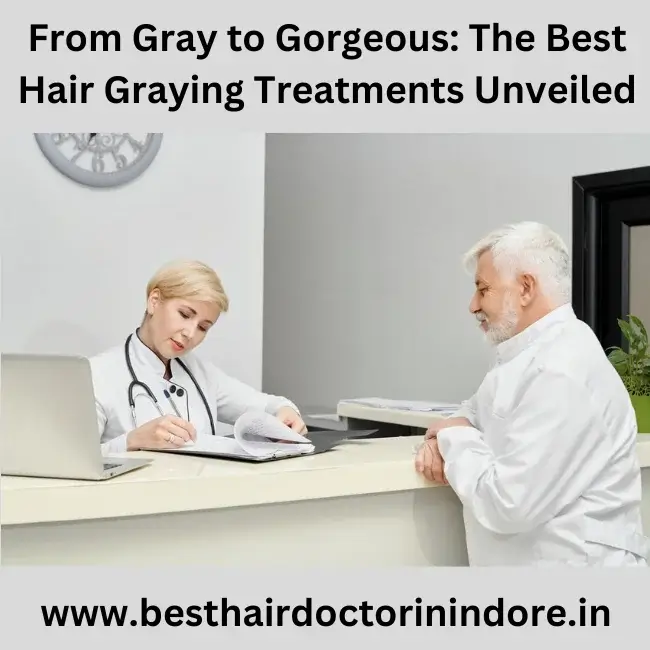Gray hair is a natural part of the aging process, and many people embrace it as a sign of wisdom and experience. However, for those who are concerned about their graying hair or wish to slow down the process, seeking the guidance of a doctor can provide valuable insights and effective treatments., we will explore the options available for best treatment for hair graying by a doctor and shed light on the science behind these treatments.
Table of Contents
ToggleUnderstanding the Causes of Gray Hair
Before delving into treatments, it’s essential to understand why hair turns gray in the first place. The primary reason is the gradual reduction in melanin production, a pigment that provides color to our hair. As we age, melanocytes, the cells responsible for producing melanin, become less active. This leads to a loss of pigment and, consequently, the appearance of gray or white hair.
Gray Hair Treatment Options by a Doctor
Prescription Medications: Some doctors may prescribe medications that can potentially slow down or reverse the graying process. One such medication is minoxidil, which is commonly used to treat hair loss but has shown some promise in restoring hair color.
Antioxidant Supplements: Antioxidants like catalase, which help break down hydrogen peroxide in the hair follicles, are sometimes recommended to combat the oxidative stress associated with graying hair.
Vitamin and Mineral Supplements: Deficiencies in certain vitamins and minerals, such as B vitamins, iron, and copper, can contribute to premature graying. A doctor can recommend supplements to address these deficiencies.
Topical Treatments: Some topical treatments, such as serums and lotions, contain ingredients designed to promote melanin production or protect existing melanin from degradation.
Platelet-Rich Plasma (PRP) Therapy: PRP therapy involves drawing a small amount of the patient’s blood, processing it to concentrate platelets, and then injecting it into the scalp. While primarily used for hair restoration, it may also have some benefits for hair color restoration.
Lifestyle Modifications: Doctors may suggest lifestyle changes such as stress reduction, a balanced diet, and adequate hydration to promote overall hair health and potentially slow down graying.
Laser Therapy: Low-level laser therapy (LLLT) is a non-invasive option that some doctors recommend for hair loss and graying. LLLT devices emit low-level lasers or light-emitting diodes to stimulate hair follicles and potentially improve hair color.
Consulting a Doctor for Gray Hair Treatment
If you are considering seeking treatment for your gray hair, it’s crucial to consult a qualified medical professional, such as a dermatologist or a trichologist, who specializes in hair and scalp health. They can assess your specific situation, conduct any necessary tests, and recommend a tailored treatment plan based on your unique needs and goals.
Conclusion
While gray hair is a natural part of the aging process, there are options available for those who wish to address it. Consulting a doctor for best treatment for hair graying can provide you with expert guidance and access to effective treatments that may help you achieve the desired results. Remember that the most suitable treatment option will vary from person to person, so it’s essential to have a personalized plan that aligns with your goals and preferences. Embracing your natural hair color or seeking treatment is a personal choice, and both options are valid as long as they make you feel confident and comfortable in your own skin.







